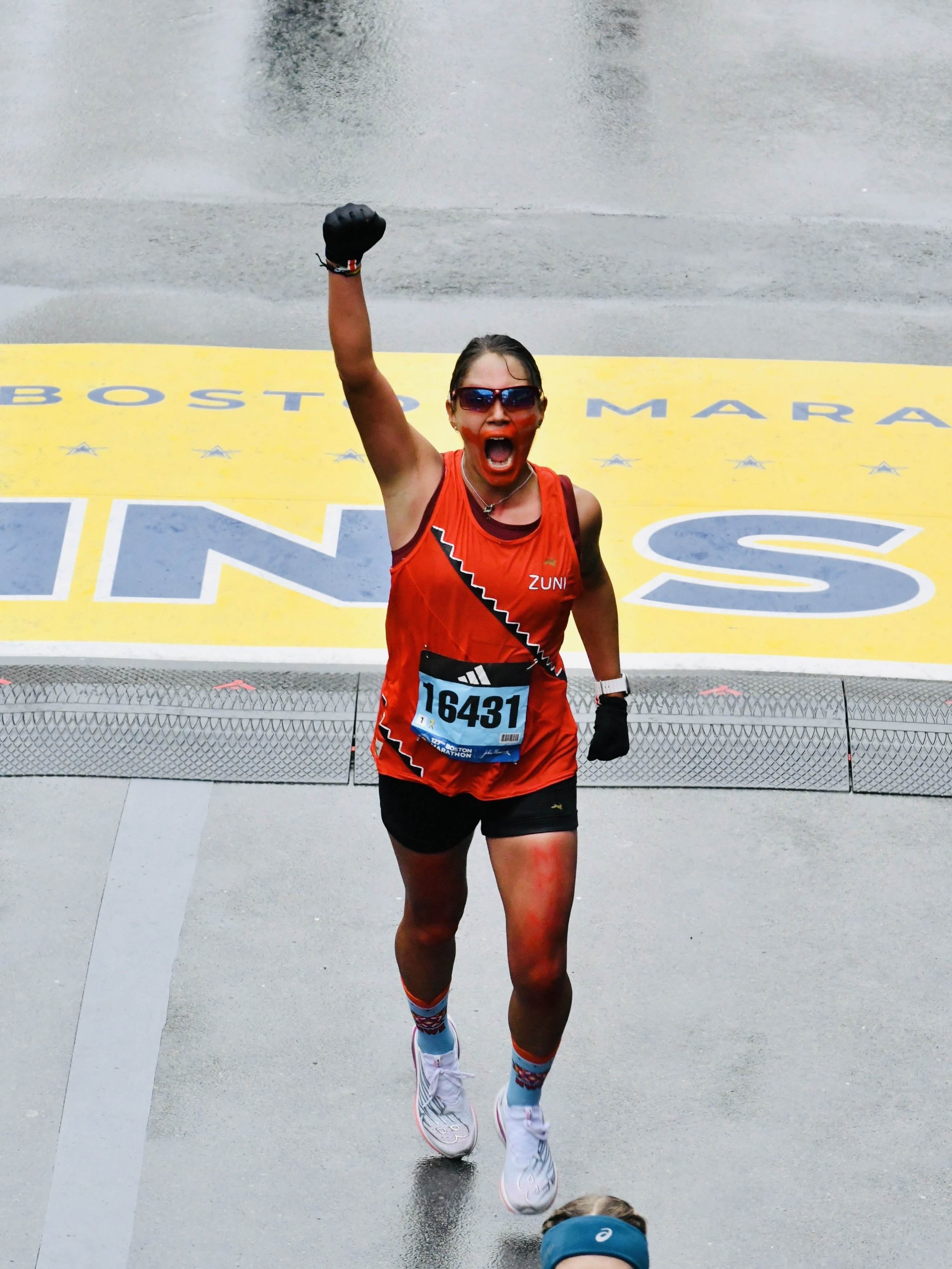The Marathon Is My Resistance
I spent the Christmas before the 127th Boston Marathon at a funeral. I stood outside on the red dirt, breathing in the cold morning air of Zuni, New Mexico. I kept looking into the dancing flames of the fire the men were tending for an answer. Any answer. Inside the house, my niece’s cousin, Jada Gonzales, lay wrapped in blankets.
She’d been shot at a house party several days before. She wasn’t a target. She was just in the way of the bullet. She was eighteen years old. She had a full scholarship to college she’ll never get to use. Later that afternoon, I ran nineteen miles around our sacred mesa, Dowa Yalanne, and screamed.
I spent the week before the 127th Boston Marathon agonizing over a decision that fate had already made for me. I’d seen Jordan Marie Daniel do it. I’d seen Rosalie Fish do it. I had to honor my heartbreak. I put the red handprint on my face, and I wrote Jada’s name on my thigh. Then I carried them 26.2 miles over Nipmuc, Wampanoag, and Massachusetts lands, from Hopkinton to Boston.
In prayer. In protest.
Over 300 years ago, before America was born, my ancestors rose against their Spanish invaders in the Pueblo Revolt. Runners carried messages of rebellion between the villages. Runners made the revolution possible. Runners have always been messengers of change. Sport has always been more than competition. Athlete activists have always been a political force. Tommie Smith and John Carlos raised their fists in Mexico City. Bobbi Gibb and Kathrine Switzer raced Boston anyway. They made history.
More recently, at the finish line of the Olympic Marathon in Rio, Ethiopian runner Feyisa Lilesa crosses his wrists over his head to protest the ethnic cleansing of his Oromo people back home. American runners Jesse Joseph, Aidan Reed, and Nadir Yusuf cross the finish line of the U.S. Olympic Marathon Trials waving Palestinian flags to protest the Gazan genocide. Native American runners Jordan Marie Daniel, Rosalie Fish, and others—like myself—race with red handprints and raised fists to honor our Missing and Murdered Indigenous Relatives.
When I toe the start line of the 129th Boston Marathon, I will be the most under-trained and underprepared I have ever been for a marathon. My body has been too stressed to train. On the day of his inauguration as president, Donald Trump signed an executive order intended to erase transgender people like me from public life. Donald Trump has since signed another executive order targeting transgender athletes in women’s sports specifically.
This will be the first time I race the Boston Marathon where my only goal is to carry my body across the finish line. Because mine is a transgender body that tyrants want to erase from existence. Because my body is a testament to my ancestors’ relentless survivance and my own reckless determination to live.
I race because racing is when I feel most alive. I race because the raw breath in my lungs and the beat of my heart are the spirit of my ancestors in my body.
I race because I have messages to carry and miles to carry them.
So I will raise my own fist. So I will race Boston anyway. In prayer. In protest.
Because the Boston Marathon is more than a race. The marathon represents the defiance and resilience of the people who become part of it.
The marathon is our history: from Onondaga runner Tom Longboat—who set a new course record with his victory in 1908—to Narragansett runner Ellison Brown—whose victory over Johnny Kelley in 1936 created the myth of Heartbreak Hill. Later that year, Ellison Brown represented Team USA along with Jesse Owens at the Olympics in Nazi Germany.
In 2014, one year after the bombing, Meb Keflezighi—an Eritrean-American immigrant—followed Ellison Brown’s strategy. He set a fast pace early in the race. He broke away from the pack. No one caught him. Carrying the names of bombing victims on his race bib, Meb Keflezighi ran into legend as the first American to win the Boston Marathon in more than 3 decades.
It’s a legend worth telling.
In 2025, we need that defiance and resilience more than ever. I believe in us.
Because we are one. We are strong. We are Boston Strong. Forever.
Enjoyed this article? Get updates on the movement, volunteer opportunities, and more by clicking below.
